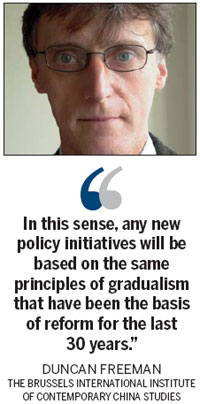On The Agenda
Updated: 2013-11-01 10:04
By Fu Jing (China Daily Europe)
|
|||||||||||
Pragmatic approach
For some observers, the plenum is important as the new leadership comprising economists, lawyers and humanists provides a more pragmatic approach towards reforms.
Michal Krol, research associate at the European Center for International Political Economy in Brussels, says the present leaders are mostly individuals who have spent most of their working life with government organizations. "They have an appetite for reforms, not least to meet the ongoing social, economic and environmental challenges," he says.
Krol adds that while there is no doubt China has set stiff targets, its eventual success depends on how much leeway policymakers allow, and how they plan to streamline market liberalization.
 |
"State-owned and state-controlled enterprises dominate the sectors with the highest potential for service productivity and employment growth. Liberalization of transport, finance, telecommunication, healthcare and business sectors by allowing more foreign firms is the most effective way to foster reforms," Krol says.
Echoing Krol's views is David Fouquet, director of the Europe-Asia Research Network in Brussels. "This implies a reconciling of the roles of large state-owned enterprises and what might be termed the true fundamental economy, as well as the provision of social and life services to the majority of the population."
Many observers feel China's reform should be gradual as it has been in the past decades. Duncan Freeman, senior researcher at the Brussels International Institute of Contemporary China Studies, says President Xi Jinping and Premier Li Keqiang have been part of China's leadership for years, and they subscribe to the basic policy consensus that has long existed.
"In this sense, any new policy initiatives will be based on the same principles of gradualism that have been the basis of reform for the last 30 years," Freeman says. "However, they have spoken of the need for greater political courage in tackling reform, so I would hope to see a package of reforms that take significant steps toward addressing fundamental issues faced by China today."
The basic reform goal for China should be to continue to push ahead with the welfare of the Chinese people, which would involve not just GDP and income growth but also issues such as healthcare, education, welfare, the environment and social and political development, Freeman says.
The domestic challenges are many, and are a complex of interrelated problems that cannot be solved individually. The risks in areas such as the financial sector, investment, the environment and others are many and threaten the sustainability of what has been achieved so far.
Freeman says: "A key area is investment, and how it is allocated, since this has an impact not only directly on issues like overcapacity, but also to other areas such as risk in the financial system, the environment and energy, and the economic welfare of the ordinary Chinese people since they are losers in a system where overinvestment is prevalent."
Another key area is institutional reform and capacity building, since this is central to reform.
Maria Jesus Herrerias, senior research fellow of contemporary Chinese Studies at the University of Nottingham in the United Kingdom, says China needs to promote further economic reforms to avoid the middle-income trap, which can be addressed at domestic and international levels.
At home, China needs to improve the efficiency of banks, and small and medium enterprises need to get access to credit to finance their investment projects and convertibility of the renminbi to facilitate international transactions. Meanwhile, China also needs to generate more incentives to boost domestic consumption, at the expense of traditional savings, to offset the predominance of foreign demand as a source of economic growth.
"The continuous dependence on external demand exposes China to international shocks like the current economic crisis," Herrerias says.
Opening up
China's reforms at home and opening up outward have mostly gone in tandem, with external opening up providing the much-needed impetus for domestic reform. China's entry to the World Trade Organization a decade ago paved the way for more reforms and the country's economic achievements, experts say.
Recent reform efforts have come amid major shifts in the global economic balance and international power. Chin of York University says most of the changes the world is dealing with today, including global governance, were not foreseen 20 years ago, let alone 35 years ago, when China first set out on the road of reform and opening up.
"The world today is less safe than 35 years ago, in that we are dealing with a number of fissures that threaten global security, including the rise of religious extremism, and ethnic or even civilization conflicts, rather than focusing on one major line of geopolitical tension," Chin says.
Ford, former European Parliament member, says China is now a global economic power even if some factors still have to come to terms with this new world order. "Yet in a sense it is more isolated - and perceives itself threatened - than two generations ago."
At the same time, Chin says the world is now seeing the re-emergence of many regions and economies of the South, and the rise of a group of major emerging or re-emerging economies. "China is now at the heart of many of these global shifts," Chin says. "It will be essential for China to play a constructive role, and more robust role, in helping to ensure that the world evolves toward a more sustainable, fair, stable and safe global environment."
Chin hopes China will continue to pursue necessary reforms to the international monetary, financial, and trade systems and promote reforms of the Bretton Woods system (that is the IMF, World Bank and WTO reforms).
"The 2008 global financial crisis showed that such reforms are much needed. The ongoing challenges of European sovereign debt and of the European banks, and the fragile recovery of the US economy suggest that more changes are needed," Chin says.
China should help strengthen the role and capabilities of the UN system, especially by giving greater support to the UN in championing global development and ecological sustainability, he says.
Ford says that China should open up more economically, especially in sectors such as telecoms, banking and finance, make the renminbi one of the three global reserve currencies, exert its rightful weight in the international forums and build bilateral trading relations with key global players.
Chin says China should host the G20 summit in 2016 and encourage G20 leaders to focus on strengthening financial stability arrangements, and provide global leadership on ensuring delivery of the Bretton Woods reforms.
The new leadership has taken measures in the bilateral and multilateral spheres. It has decided to develop a new type of foreign relations, especially with the US. It has advocated launching a new Silk Road in central Asia and a coastal Silk Road with southern neighbors. It has started to engage in bilateral trade and investment pacts while pursuing multilateral efforts.
Former BBC journalist Kirby says China has a huge contribution to make to global systems. On climate change, it is already providing an example by doing what is in its own interest (decarbonizing its economy). "This makes it harder for other countries to resist adopting similar policies, and that benefits the whole planet," Kirby says.
He goes one step further and adds that since China is such a large and important country, doing what is in its own interests is certain to be of interest to others also. China should also open up to some of the global economic and trade regulatory systems, he says.
However, Schoenhals feels that China should not follow the path trod by other powers such as the US as it would lead to aging infrastructure and lack of sufficient social services for people, since most of the money ends up being used for military purposes. "I know China is proud of being a peaceful nation ... I hope China will not follow America's lead and will instead find a way to disarm, rather than arm."
Freeman feels that the global situation and China's position in it has changed since the late 1970s and the level of global interdependence between China and the rest of the world is now far greater. "China is more integrated into global policymaking, but the greater interdependence means that expectations and demands on China from the outside world have also increased.
"China can no longer act in isolation, and this greatly increases the complexity of policymaking, even if the priority remains domestic development."
Fouquet says the international system has reached an extremely interesting and challenging point, largely because of the growth and development of China and Asia, and the relative reduction of influence of the West, Japan and other regions from the Middle East and Central Asia.
"While I am not alarmist, I believe there is urgent need for Asia to develop a more appropriate community of cooperation and even greater integration, rather than the current divisive atmosphere," says Fouquet. "China has responsibility for changing the situation."
Kirby also believes China should make more effort to live peacefully with its neighbors. "A China at peace within its own borders could transform those far-from-perfect systems so that they work with respect for all," he says.
Zhang Chunyan in London contributed to this story.
fujing@chinadaily.com.cn
( China Daily European Weekly 11/01/2013 page6)
Today's Top News
Premier Li seeks point of balance
Reform roadmap before key meeting
Intel leaks proved justified: Snowden
Cooperation needed in terror fight
Beijing to further boost visa-free stay
Shenzhou X crew awarded for outstanding service
US to file murder complaint against LAX shooter
China's non-manufacturing PMI rises in October
Hot Topics
Lunar probe , China growth forecasts, Emission rules get tougher, China seen through 'colored lens', International board,
Editor's Picks

|

|

|

|

|

|





